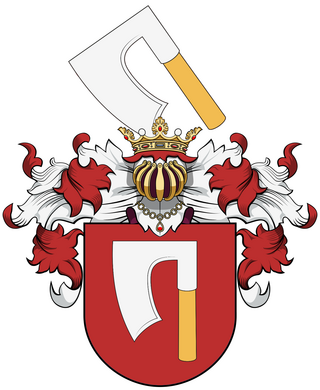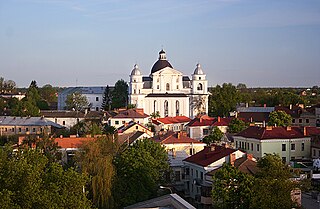
Powązki Cemetery, also known as Stare Powązki, is a historic necropolis located in Wola district, in the western part of Warsaw, Poland. It is the most famous cemetery in the city and one of the oldest, having been established in 1790. It is the burial place of many illustrious individuals from Polish history. Some are interred along the "Avenue of the Distinguished" – Aleja Zasłużonych, created in 1925. It is estimated that over one million people are buried at Powązki.

Topór is a Polish coat of arms. It was used by several szlachta (noble) families in medieval Poland and under the Polish–Lithuanian Commonwealth.

The House of Ossoliński is the name of a Polish szlachta (nobility) family. Because Polish adjectives have different forms for the genders, Ossolińska is the form for a female family member.

Franciszek Smuglewicz was a Polish-Lithuanian draughtsman and painter. Smuglewicz is considered a progenitor of Lithuanian art in the modern era. He was precursor of historicism in Polish painting. He was also a founder of Vilnius school of art, his most prominent students were Jan Rustem, Jan Krzysztof Damel, Gaspar Borowski and Józef Oleszkiewicz. His father Łukasz Smuglewicz and brother Antoni were also painters.
The ideas of the Age of Enlightenment in Poland were developed later than in Western Europe, as the Polish bourgeoisie was weaker, and szlachta (nobility) culture (Sarmatism) together with the Polish–Lithuanian Commonwealth political system were in deep crisis. The period of Polish Enlightenment began in the 1730s–40s, peaked in the reign of Poland's king, Stanisław August Poniatowski, went into decline with the Third Partition of Poland (1795) – a national tragedy inspiring a short period of sentimental writing – and ended in 1822, replaced by Romanticism.

Franciszek Ksawery Lampi, also known as Franz Xaver Lampi, was a Polish Romantic painter born in Austria of ethnic Italian background. He was associated with the aristocratic circle of the late Stanisław II Augustus, the last Polish king before the foreign partitions of Poland. Lampi settled in Warsaw around 1815 at the age of 33, and established himself as the leading landscape and portrait artist in Congress Poland soon after Napoleon's defeat in Russia.

Augustyn Mirys was a Polish painter of Scottish-French origin.

The Roman Catholic Diocese of Lutsk was first established in the 13th century as the diocese of Luceoria (Latin) or Łuck (Polish). After the victory of Napoleon, the diocese was joined with the Diocese of Zhytomyr, forming the diocese of Lutzk-Zhitomir-Kamenetz. In 1925, the diocese of Lutsk was restored and the Diocese of Zhytomyr became separate.

Franciszek Rychnowski was a Polish engineer and an inventor, who also lectured at the Lwów Politechnic. In addition to mundane projects, he also gained fame for his pseudoscientific theories on eteroid, similar to the concepts of élan vital or orgone; involvement with such pseudoscientific theories eventually ruined his career.

The Diocese of Włocławek is a Latin Church ecclesiastical territory or diocese of the Catholic Church in Poland. It is a suffragan in the ecclesiastical province of the Metropolitan Archdiocese of Gniezno. Until the 20th century, it was known as the Diocese of Kujawy.

Stanisław Szenic was a Polish lawyer and writer.
Franciszek is a masculine given name of Polish origin. It is a cognate of Francis, Francisco, François, and Franz. People with the name include:

The Kołłątaj's Forge was a group of social and political activists, publicists and writers from the period of the Great Sejm in the Polish–Lithuanian Commonwealth.

The House of Branicki was a Polish aristocratic family. The family acquired influence in the Polish–Lithuanian Commonwealth in the 18th century.
This page is based on this
Wikipedia article Text is available under the
CC BY-SA 4.0 license; additional terms may apply.
Images, videos and audio are available under their respective licenses.











